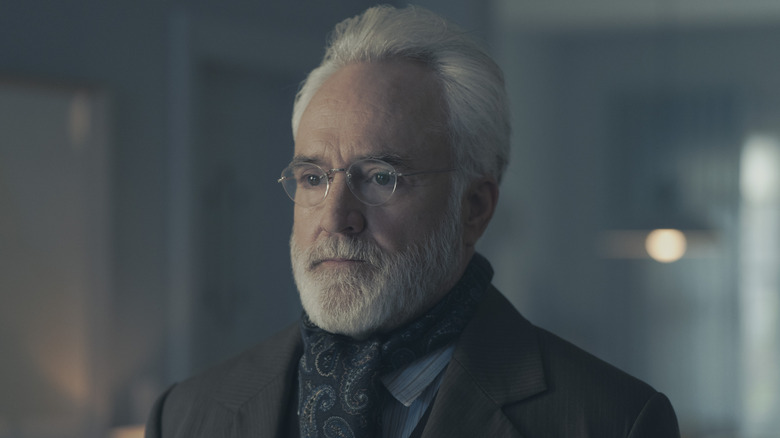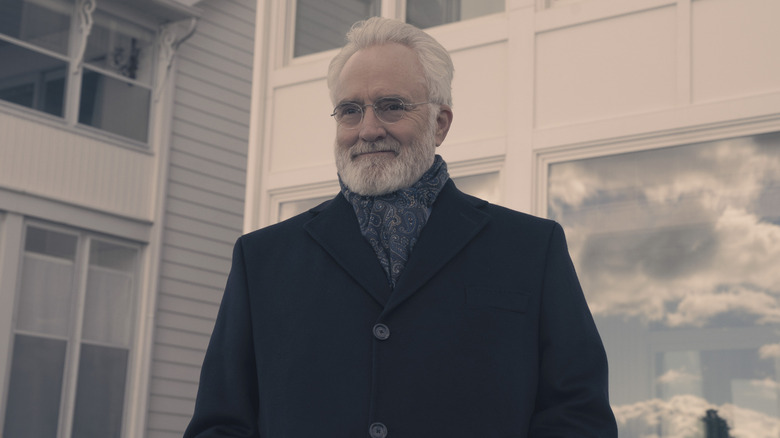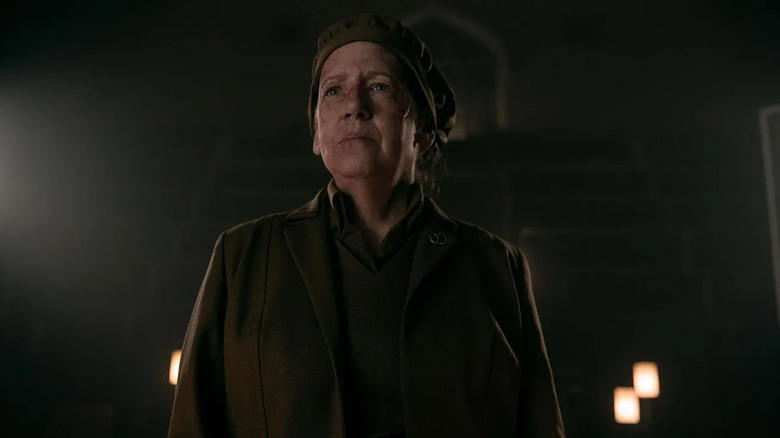The Handmaid's Tale Season 6's Book Of Mormon Reference Suggests How The Show Will End
This article contains spoilers for the first three episodes of "The Handmaid's Tale" season 6.
The third episode of "The Handmaid's Tale" season 6 is titled "Devotion," and we've seen how devotion to religion can become poisonous when Gilead forces women into sexual slavery. But some of the most faithful characters are starting to question their own devotion or the devotion of others. In the previous episode, "Exile," Commander Lawrence barely joins dinner prayers. Serena later demands he gets down on his knees and say his own. He repeats Serena's same prayer from another night, causing her to question what is driving him to create New Bethlehem if it isn't God. He replies that whether it's God or not, he can't prove or disprove it. "And as they wrote in the 'Book of Mormon' musical, that's kind of what God was going for, right?" he dryly jokes. It's always jarring when there's a popular culture reference in "The Handmaid's Tale," reminding us that their version of America was ours before it transformed into a totalitarian nightmare.
The "Book of Mormon" line is from the upbeat jaunt "The All-American Prophet" where Elder Price, a devout Mormon missionary, describes his beliefs. Mormons consider 1800s America as Biblical times, and when Joseph Smith discovers the golden plates, God asks him to just copy them onto regular paper. As Joseph nears his death, he dramatically asks God why he is letting him die without showing people the plates. "They'll have no proof I was telling the truth or not," he sings. This idea of his followers needing to have faith and believe without seeing is "sort of what God is going for." The religious satire by the "South Park" creators Trey Parker and Matt Stone actually says a lot about what's currently going on with the characters in this show as the vise grip that Gilead has on them slowly loses some of its strength.
Commander Lawrence also mocks religious extremists
Commander Lawrence would love "The Book of Mormon" because he's always been aloof about religion. He often makes snide remarks in his deep, laconic voice about those in charge at Gilead, calling them "religious nutjobs." In "Dear Offred," he schools Lydia on the true purpose of the handmaids: They need to remain "accessible" for Commanders to "do whatever the hell they want and get their rocks off. These are pious men; they need a little kink." In "Pigs," he shrewdly observes, "Gilead doesn't care about children. Gilead cares about power. Faithfulness, old-time values, homemade bread — that's just the means to the end. It's a distraction and window-dressing." He is keenly aware of how religion can be twisted into extremism to control, manipulate, and change the minds of others. That's how he can exploit the believers for his own personal gain.
Trey Parker and Matt Stone poke fun at the oppressive rules of Mormonism just as Commander Lawrence does with Gilead's Christian fundamentalists. He would clearly get a kick out of how the Mormons tap dance away their traumas (such as repressed homosexuality or a sister's death) in "Turn It Off." In "Spooky Mormon Hell Dream," dancers dressed as giant coffee cups are manifestations of Elder Price's anxieties about sinning. Sneaking a donut as a child equates you with Hitler and sends you straight to hell to burn for eternity. The Mormons' over-the-top sunniness when spouting racist and fantastical beliefs, such as only accepting Black people in 1978 and the idea of having your own planet in the afterlife, would bemuse the cynical Commander Lawrence. The musical's earnest but biting humor perfectly matches actor Bradley Whitford's natural wit and role as the shifty non-believer.
The Handmaid's Tale characters are waking up to Gilead's brutal realities
In "The Book of Mormon," the wide-eyed Elder Price is filled with religious doubt after seeing the disease, poverty, and famine the Ugandans face. In his view, they don't have faith because, essentially, God has said "f*** you" to them. It's not until he sees Elder Cunningham connecting to them through his humorous and empathetic sermon — with some imaginative Bible facts from "Star Wars" and "The Lord of the Rings" sprinkled in — that Elder Price begins to understand that faith should come from a genuine place of caring for others, rather than ostracizing them based on strict commandments or a fear of going to hell.
We're starting to see the inklings of similar epiphanies with Aunt Lydia in "The Handmaid's Tale," when she discovers that the long-suffering Janine is a Jezebel. Ann Dowd, who is getting her own spin-off, typically gives a ruthless performance but is now heartbreaking, her mouth quivering in despair. She demands that Commander Lawrence explain why the Handmaids, who should be venerated for their "sacred service" of bearing fruit (and whom she devoted countless time rigidly training) are being treated so poorly. She's beginning to see that the puppeteers of Gilead do not truly care about children, or the service that Handmaids provide. Serena also seems to be teetering on a similar awakening. She recalls discussions with her father about her budding book career, and seems bitter that her knowledge and public speaking skills were ripped away from her as a silent, obedient wife.
This small reference to the provocative and hilarious musical "The Book of Mormon" could be hinting towards the big ideas of this final season: The questioning of faith and the gradual dismantling of power structures, all leading to the possible toppling of Gilead.
New episodes of "The Handmaid's Tale" season 6 hit Hulu on Tuesdays.


